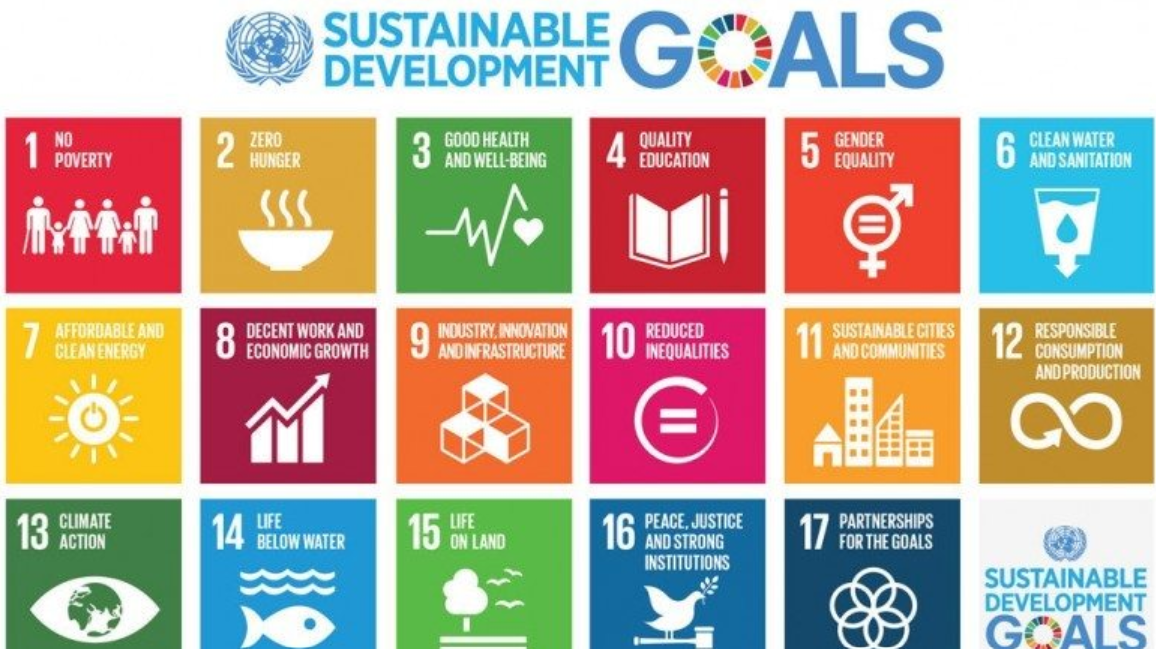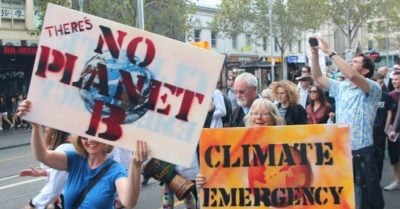Doug Casey and E.B. Tucker on the Climate Change Hoax
by Doug Casey, International Man:

Chris’ note: “How dare you!”
“You have stolen my dreams and my childhood with your empty words.”
On Monday, 16-year-old Swedish climate activist Greta Thunberg delivered a powerful speech to world leaders at the United Nations Global Climate Action Summit in New York.
Her message was clear. She accused them of not doing enough to save the planet.
And leading up to the summit, New York City announced that its 1.1 million public school students could skip class to join the global climate strike protests. Thousands of teenagers ended up flooding the streets of Manhattan, demanding change.
All of this kicked the climate change debate into high gear.
So today, I’m handing the reins to Doug Casey and E.B. Tucker to make sense of all this hysteria.
As longtime readers know, Doug and E.B. share the same controversial opinion: Climate change is one big hoax.
Below, they explain why…
Question: E.B., you’ve called global climate change a “hoax” before in your Strategic Investor newsletter. That’s a bold claim. After all, most people think that, one, climate change is happening, and two, that humans are causing it.
Why do you think it’s a hoax?
E.B. Tucker, editor, Strategic Investor: Let me start by saying that I’m skeptical of anything about matters where everyone is in agreement. I’ve been this way my whole life. This goes for things like, “You’ve got to go to college. You’ve got to have medical insurance. You’ve got to vote. You’ve got to buy a house.” Everyone says you should do these things, but those things don’t always work out so well for people.
And climate change has reached the point where there’s universal agreement. On a hot day, the average person will tell you it’s because of climate change. Then, he might say that it’ll be 175 degrees here in 75 years if we don’t do something about the climate.
Earlier this year, I was having lunch in Delray Beach and I overheard the guy behind me telling the people at his table how there’s not going to be any snow in Aspen 50 years from now because of climate change. And everyone agreed saying, “I know. I heard the same thing. It’s just awful.”
I just started cracking up. I mean why would there be no snow in Aspen 50 years from now? What would cause that?
The average person has no clue. And yet, there’s now this hysteria around climate change. People are completely sure that humans are causing the planet to warm. The lady at the checkout counter will tell you that climate change is going to be the end of us.
Question: A statistic that gets passed around is that 97% of climate scientists think global warming is real and largely caused by humans. Do you think they’re all wrong?
Doug Casey, founder, Casey Research: Yeah, this 97% figure keeps popping up. Regrettably, it’s impossible to properly debunk the number in a brief discussion such as we’re now having. I suggest readers simply google “97% of scientists climate claim debunked” and see what they get.
That 97% number was promulgated by an Australian blogger named John Cook in 2013. It’s as ridiculous, but has as much popularity, as Al Gore’s “hockey stick.” Out of hundreds of thousands of papers that have been done on climate, he chose 12,000 and manipulated and subjectively interpreted parts of their abstracts to support his a priori beliefs. Many scientists whose names were used subsequently protested. A subsequent recalculation showed that less than 2% of the papers cited actually believe mankind is mainly responsible for any global warming.
But the usual suspects in politics, the media, and the entertainment business picked up on the terms “97%” and “scientists.” They repeated them as a mantra, and now the public assumes – based on almost nothing but repetition – that anthropogenic global warming [AGW] is a critical danger to life on Earth.
Truth in science isn’t determined by consensus. But, for what it’s worth, another survey was taken in 2009 among 31,000 hard scientists – physicists and chemists, not sociologists and psychologists – including 9,000 with Ph.Ds, who explicitly stated they believed there was no evidence of significant AGW.
Question: But data from NASA shows the last five years have been the hottest years on record. What do you make of this, E.B.?
E.B.: Look, what if today is warmer than yesterday. Does that necessarily justify a trend? I wouldn’t say so. I need to see a lot more than that to be convinced.
The problem is that a lot of times you look at this stuff and they’ll say, “It’s the warmest weather on record back to 1910.” Wait a minute. What was happening then?
I believe that the planet goes through weather cycles. And these cycles have much more impact on the climate than humans. But people are uncomfortable with that because they like to think that humans are the most powerful organism in the universe. I’m not sure that that’s the case.
I think that the patterns of weather are much bigger than human influence.
Of course, the average person doesn’t think this way. That’s because they only hear from scientists what they want to hear. But as Doug mentioned a minute ago, there are a lot of scientists that disagree with the “consensus” view on climate change.
And all these strange things happened to them. They lose grants. Their research doesn’t get published. So you don’t see them in Time magazine, USA Today, National Geographic, or on 20/20 or 60 Minutes, which is where most people get their news.
There are a lot of scientists who don’t buy the man-made climate change theory. But they’re branded as rogue. And you’ve got the whole thing with John Coleman who co-founded the Weather Channel. He was an outspoken critic of climate change hysteria. He said there was no significant man-made global warming and no reason to fear it in the future. The Weather Channel, the company he co-founded, sent its chief executive on CNN to distance the company from Coleman.
The point is, people who come out and say, “Look, I don’t think this is the case,” are not well thought of.
Doug: E.B. is correct. The climate is changing, of course – it’s been changing for the entire 4.5 billion years of the Earth’s history.
I am, therefore, a believer in climate change. But there are many reasons why it’s changing, and we can get to those in a second. The important ones have nothing to do with mankind.
The warmists say it’s because of carbon dioxide generation. But carbon dioxide is a trace gas in the atmosphere. It only accounts for about .04% of the atmosphere. Nitrogen, on the other hand, makes up 80% of the atmosphere. Oxygen accounts for the other 20%. Water vapor, or H2O, has a far, far greater influence on the atmosphere than CO2.
I’ve been a science buff my whole life, and I’ve read many papers on both sides of this issue. In the ’70s, I remember seeing magazine covers showing glaciers toppling the skyscrapers of New York. The hysterics were worried about a new ice age back then.
Since the ’80s though, they’ve been beating a drum for AGW. They completely omit the fact that the Earth went through a period when it was a giant snowball.
We’ve had at least four major ice ages just during the Pleistocene, the last couple of million years. Glaciers several miles thick covered most of the United States. The last ice age ended about 11,000 years ago. Since then, the planet has been cyclically warming. But you have to keep this in context. Those were glacial periods that lasted 100,000 years or so. There have been times in the Earth’s history, like the Cryogenian period about 700 million years ago, that lasted 100 million years, when the entire planet might have been a snowball.
Put it this way. If we had a choice – and we don’t – we’d be much better off if the planet warmed a couple of degrees than cooled a couple of degrees.
E.B.: Right. This climate change stuff didn’t come out of nowhere. The propaganda is about 40 or 50 years in the making. But back in the ’50s and ’60s, people thought the opposite. People were worried about global cooling. They thought the world was going to turn into a giant frozen tundra like Siberia. That was the fear.
Then, on the first Earth Day in 1970, Paul Ehrlich said that all the fish in the oceans would die and wash up on shore.
Then, the fear was acid rain. And then everyone was worried that a hole was going to appear in the ozone layer.
Now, people don’t even use the phrase global warming anymore. They dropped that. Now, they say climate change. It’s an ongoing public relations machine. So, this thing keeps evolving.
I just wonder what the next chapter in the climate saga is going to be because they’ll come up with something new, like a marketing slogan. They’ll put it out there and then everybody will eat it up.
It’ll be fun to watch people buy into it. Somebody will go on 60 Minutes and say, “I’m here looking at this new thing and it’s really frightening for all of us.” Then, they’ll bring a 6-year-old to the White House as they always do and say, “Mr. President, please save the planet for my future.”
Question: If humans aren’t behind climate change, what’s causing temperatures to rise?
Doug: The sun, primarily. The sun is the only thing that stands between us and the Earth turning into a dead snowball about two degrees above absolute zero. Climate fluctuations are mainly caused by fluctuations in the sun’s intensity. But they’re also caused by the gradually changing tilt of the Earth’s axis. And Milankovitch cycles, dealing with changes in the Earth’s orbit around the sun. The solar system’s movement around the galaxy may have major, but as yet unpredictable effects on the climate. But there are other important factors.
Volcanism is one. There are always 40 or 50 spewing gigantic amounts of gas into the atmosphere at any one time – and many more under the oceans. The ocean is a vastly more important heat sink than the atmosphere, and the circulation of ocean currents is critical to climate. The atmosphere is thin and lightweight by comparison to the ocean.
The thing that most concerns me about global warming hysteria is that it might discredit the very idea of science for the average man. They vote on concepts they have almost no understanding of. The average voter has a far better understanding of the Kardashians than science. There have been a lot of spoofs where the masses have signed petitions to ban sodium chloride – table salt – and dihydrogen oxide – water – as dangerous poisons. The AGW hysteria is similar.
Question: Do you think the planet could actually start cooling soon? If so, how soon could that happen?
Doug: It’s hard to say. But any geologist will tell you that we’re in an interglacial period, and it’s highly likely there is going to be another genuine ice age when this interglacial period ends, just as they were predicting back in the ’70s. It’s just that the timing is up in the air.
The warmists never, ever, mention the Earth’s geological history. Not even its very recent history, just since the invention of writing. There have been large fluctuations in climate, confirmed with ice core drilling in glaciers, sediments on the ocean floor, and tree rings.
Read More @ InternationalMan.com
Loading...



